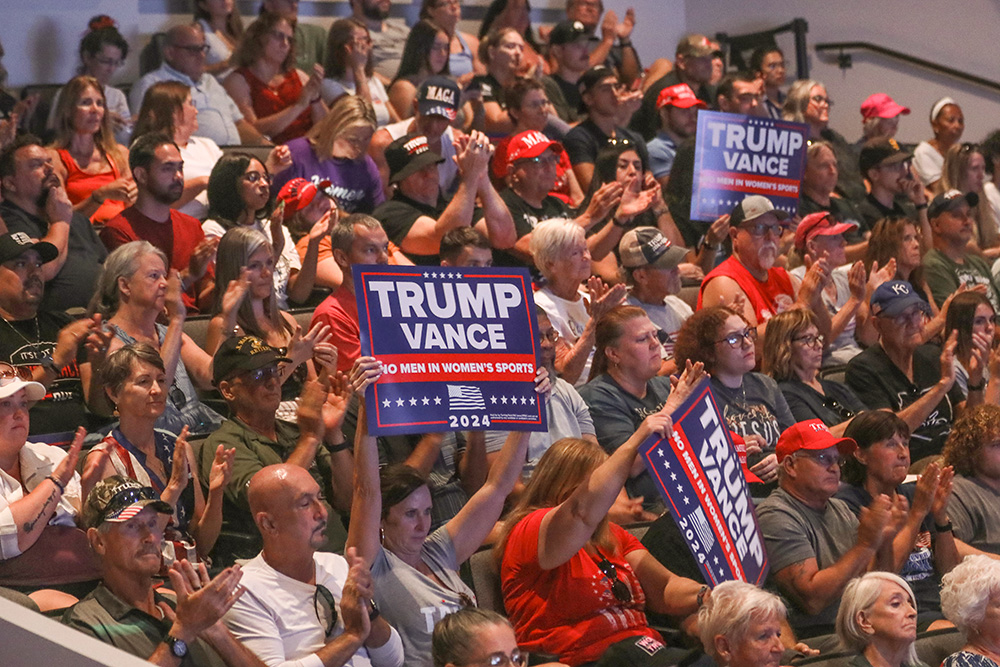
Attendees at a Chase the Vote rally, hosted by Turning Point Action, at Generation Church in Mesa, Arizona, on Sept. 4 (Flickr/Gage Skidmore)
The first difficulty with criticizing former President Donald Trump's closing argument in the campaign is that the words "argument" and "Trump" never really belong together. Arguments require evidence and logical reasoning. Trump's final pitch to the voters, like his first pitch, is about how desperately they need a strongman and displaying what he thinks counts for strength.
The moral universe Trump creates has nothing to do with the traditional sources of moral insight. There are no echoes of the Sermon on the Mount, no traces of Aristotle's Nicomachean Ethics. Trump's moral vision has all the grotesque obviousness of a professional wrestling match. It is a contest between good and evil, and both sides get to play dirty and ugly. A hero in the ring doesn't let a norm like "no hitting your opponent with a metal chair" get in the way of winning.
The fact that the battle is staged, that it demands a perpetual suspension of disbelief, this is easily acquired as part of the price of admission. If you have an inkling of doubt, you have only to look around you and see that doubt has no place in this arena.
At no time does Trump ever sound like he is calculating what he needs to say politically. He never sounds like a politician. His assertions are always full-throated. When voters say they think he is "strong" or that "he knows his own mind," it is this lack of any quibble in his voice to which they refer.
What he says may be gibberish. It may be vicious. Whatever Trump says is always said as if doubting it entails great risk, to oneself and to one's country. It is "follow the leader" on a grandiose scale.
Trump's moral vision has all the grotesque obviousness of a professional wrestling match. It is a contest between good and evil, and both sides get to play dirty and ugly.
NBC's Chuck Todd began his examination of closing arguments by looking at who the campaigns think remains undecided: "The campaigns appear to agree on who the final persuadable voter is: a Republican or Republican-leaning independent who doesn't like Trump personally but is skeptical of Vice President Kamala Harris' perceived liberal politics."
Todd points out how similar this is to the situation in 2012 when the campaigns' final focus was on a "working-class union member in the Midwest who didn't love the left on culture but didn't trust the right because of its ties to corporate boardrooms."
Stop right there. Todd's observation contains something truly frightening. If you can compare an election featuring Trump as a candidate with an election that featured Mitt Romney, Trump has succeeded in normalizing himself.
One means of appearing normal is to make the other side look bonkers. Democrats have left themselves wide open on some culture war issues and the Trump team is not afraid to hit them hard.
There is no poll that indicates transgender-related issues are at the top of voters' concerns, but Trump understands it is totemic. Harris is from the San Francisco Bay area, long an avatar for gay rights. He knows that Gallup found that 69% of Americans don't support letting transgender athletes play on whatever teams they want, and so he hits that issue in media appearances when he can. Trump doesn't care about the fairness of high school sports. He wants to paint Harris as extreme.
Trump's campaign has been pouring millions of dollars into ads that target Harris' position on transgender issues. "Taxpayer funded sex changes for prisoners," is the way the Trump team frames the issue in one ad. It is not subtle.
Advertisement
Trump is not attacking same-sex marriage. As Andrew Sullivan has argued, the gay marriage movement's "case for equality was simple and clear ... 'Live and let live' in equality and dignity was the idea." A majority (54%) of Catholic voters in the swing states who participated in NCR's recent poll said the LGBTQ community should enjoy broad legal protection from discrimination.
After the Supreme Court legalized same-sex marriage in 2015, there was a shift as gay and lesbian advocacy, focused mostly on securing same-sex marriage, gave way to "LGBT+ advocacy." The reasons Sullivan gives for the shift are many, and you can agree or disagree with his criticisms of where and how the trans rights agenda landed where it did.
What is clear, however, is the political fallout from the shift. The movement for gay rights was keen to make clear it required nothing of anyone else — for example, that no churches would be expected to violate their beliefs.
The trans rights movement, however, encourages everyone to list their pronouns. Newspapers began using clunky phrases like "gender assigned at birth" as if there was a conspiracy afoot to "assign" gender. The medical establishment calls for "gender-affirming care" for adolescents, and when the most comprehensive study of the issue, the Cass Review in the United Kingdom, explains that there was no scientific justification for these irrevocable procedures, everyone yawns. If you dared to question any of it, you were labeled a "transphobe" or a "bigot."
When Fox News' Bret Baier asked Harris about the ads, she replied, "I think he spent $20 million on those ads trying to create a sense of fear in the voters, because he actually has no plan in this election that is about focusing on the needs of the American people."
That is true, but it misses the point. Trump's ads are telling voters that she is a bigger risk than he is because of her embrace of cultural extremism, that instead of worrying about kitchen table issues like the cost of groceries, she is fixated on bizarre markers of liberal identity.
True or not, it might catapult him into the White House.







